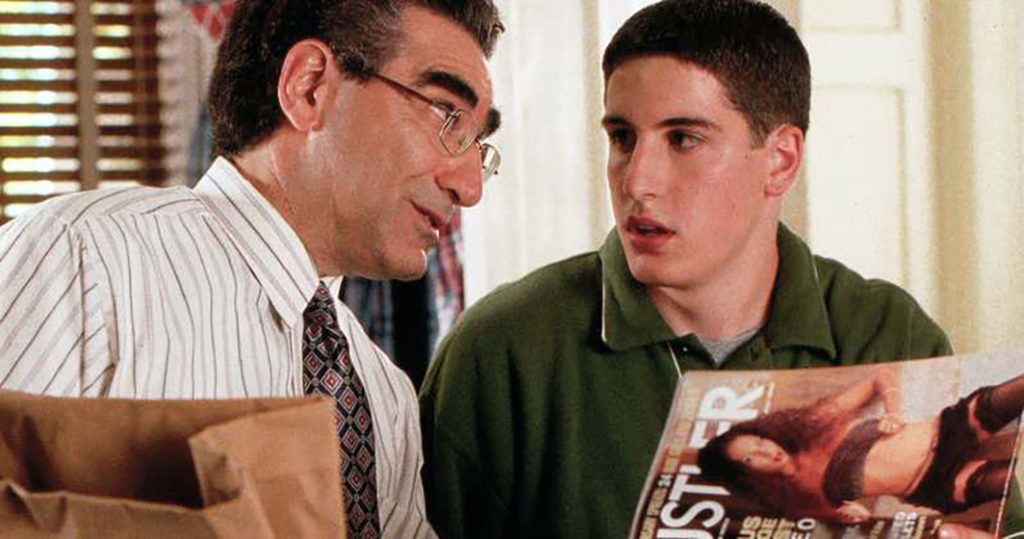Released in the summer of 1999, “American Pie” was a raucous, laugh-filled comedy that hinged itself on the pulse of the American teenager. I don’t remember what my 20-year-old self – two years removed from high school – remembered about the production. I didn’t see it in the theatre but caught it on DVD, which led to subsequent re-watchings and laughter at its main characters’ follies. The jokes, now pop-culture cannon, remain iconic: Jim’s striptease to his gorgeous crush of a foreign exchange student…Finch and Stifler’s mom, the crassness of William Scott’s Stifler…Jim’s iconic pie scene…
However, amidst the laughs lay a central theme that saw it through three sequels, all which contained the heart of the original (though I find the film’s conclusion, “American Reunion,” to be the best since the original). That theme is not laughter, hijinks, or slapstick (though these are present throughout), but rather camaraderie, trepidation, and fear of the unknown. Sure, plot-wise “American Pie” is the story of four teenagers who, believing they are destined to go to college as virgins, make a pact to lose their virginity by prom. And while writer Adam Herz and directors Paul and Chris Weitz bring the laughs in bucketfulls, they adequately capture the uneasiness and apprehension the four undergo as they attempt to reach this often pressure-filled milestone.
“American Pie” relies heavily on its cast, which thankfully are picked thoughtfully and perfectly. The film’s center, Jim (Jason Biggs), is an awkward adolescent who, at the film’s opening, gets caught masturbating by his parents in a scene that is cringeworthy yet comedic. His friends consist of Kevin (Thomas Ian Nicholas), who has a steady girlfriend who loves him yet he’s reluctant to say it back, Finch (Eddie Kaye Thomas), an odd-duck, quasi nerdy type who seems to have a grasp on women that belies his social awkwardness, and Oz (Chris Kilne), a handsome quarterback type who is the star of the lacrosse team. The four, recovering from a party at the house of their reluctant friend Stifler (Seann William Scott), leads to the aforementioned pact. “American Pie” does nothing if not break down stereotypes. Would these four be friends in high school amidst cliques and reputations in the first place? The film is less interested in the reality than the result.
What works about “American Pie” is it’s a funny film, mostly surface, but isn’t afraid to dig into he psyches of its characters when needed. It has some bare-bones raunch (like one youth who refers to a portrait of Stifler’s mom as a MILF – look it up if you don’t know), and others, focusing on Jim’s awkward attempts to lose his virginity with the lovely Nadia (Shannon Elizabeth) that are both laughs at Jim’s expense and our own. Who doesn’t remember how awkward it was to negotiate a first crush?

Oscillating around these four are supporting acts such as Kevin’s girlfriend Vicky (Tara Reid), a love interest for Oz (“American Beauty’s” Mena Suvari), a band geek named Michelle (Alyson Hannigan, who has one of the film’s funniest sequences), and of course Stifler himself. Stifler, a jock, partying, crass semi-bully draws humor throughout, even as he’s written completely surface. He’s sympathetic, and Scott plays him hysterically; though unfortunately he doesn’t get anything that answers for depth until the the series’ conclusion in “American Reunion.”
The film rounds out the cast with Eugene Levy, who plays Jim’s dad with a level of humor that is endearing and perfect.
“American Pie” succeeds by being funny without ever being mean, having sympathy for its characters instead of cynicism. It’s not as introspective as “The Breakfast Club,” nor as raw as “The Edge of Seventeen.” But it’s relatable, and buffers its off-the-wall humor with honest conversations between its cast that lend it credibility. It approaches now taboo subjects like a sexual encounter between a teenager and an older woman with grace and wit, and another, involving the unsuspected web-camming of a coed as she undresses, with humor and a degree of separation from the material.
Rather unexpectedly, “American Pie” layers its female characters as well as its male counterparts. Reid is vulnerable and real, and Suvari has possibly the film’s sweetest role as she struggles to accept Oz in her life amidst his frat-like entourage. The guys learn much about love, life, and women during their quest to “score” that a weaker film would have left by the wayside. The film’s opening presents sex as the be-all-end-all. However, by the film’s conclusion, as Jim opines, in lieu of the mounting pressure to have sex, “I’ve never even had sex, and already I can’t stand it!” we understand where he’s coming from.
“American Pie” ages well. It watches as easily in 2018 as it did in 1999, as its themes are just as relevant. Adolescence, sex, love, and high school popularity are just as pressing now as they were then. The film chronicles teen life for a modern age rife with internet and globalization. But under it all it has heart, which is the reason for its staying power. Yes, it’s funny, and yes it’s often ludicrous. But we like these people: from Jim, to Finch, all the way down to Stifler. It ends on a positive note – four friends taking stock of their growth while preparing for the next chapter – and is a smarter film than it’s often given credit for.


